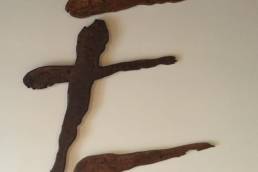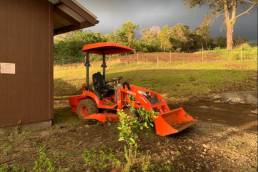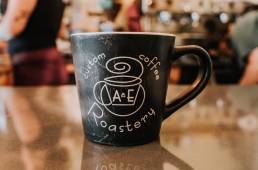
Q-Grader : Coffee :: Sommelier : Wine
The coffee experience has quickly advanced over the last 50 years. The coffee industry has gotten better at producing and processing coffee. Where specialty roasted coffee used to be darker, the better production allows for the coffee to be roasted a little lighter because the overall quality of the coffee is better. There is now quite a gap between the low quality store bought packaged coffees and the specialty coffees that has been carefully roasted to perfection. How does one even tell the difference? Enter the Q-Grader, a person that is able to evaluate the quality of coffee from origin, or where it is grown. A Q-Grader is to coffee as a sommelier is to wine.

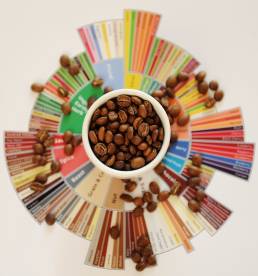
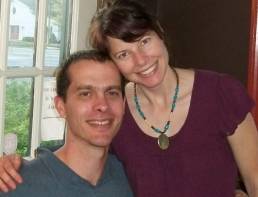
Roast & Judge
There are only about 7,000 Q-Graders world wide according to the Coffee Quality Institute. This a fairly new profession as the Specialty Coffee Association has only been an official organization since 1982. Emeran Langmaid has been a Q-Grader for 20 years and was one of the first Q-graders in the state of New Hampshire. She began her coffee journey in a coffeeshop near college where she and her husband, Adam, attended North Carolina State University.
When they moved to New Hampshire in 1998, they were missing the coffeeshop scene with the locally roasted specialty coffees that they had grown to enjoy in college. As any great business story goes, necessity became the mother of invention. They saw the opportunity so they bought a small roaster and started roasting out of their house. They hosted home parties and served different levels of roast with French presses in order to sell coffee subscriptions. This grew into a wholesale roasting company and cafe’ known as A&E Coffee & Tea.
Simultaneously, Emeran got involved with the Regional Barista Competition. It put her on track with the grading component of the job. As she began participating as a competitor and then judge, she obtained the Q-Grader licensing.
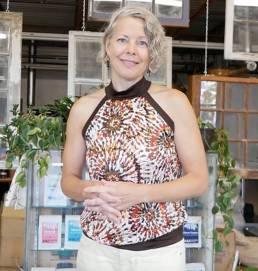
Why the "Q"?
Coffee is grown on land closer to the equator. There are many factors that determine quality including: altitude, rainfall, temperature, plants, time of bean maturation and roasting method. The Q-grader follows the coffee bean from where it is grown through roasting to where it is served. Q-Grading was developed so that it could be performed anywhere in the world with limited resources. The whole focus was to be able to put the assessment of quality back in the hands of the co-ops and the producers instead of requiring coffee to be sent to a lab and have a “white coat” make the determination of coffee grade. Q-grading is an international system that really can be performed anywhere with just a grinder and hot water kettle.
At Origin
Where coffee is grown is called origin. When the growers have completed picking and processing the red coffee cherries, they are in a state called “The Green” (unroasted coffee beans). Q graders start the process of evaluation at origin. There is a science behind grading coffee called Green Grading. It is the more objective part of the grading process. There is a book with templates that Q-graders utilize to grade the quality of “The Green”. Everything is standardized and there are defects the Q-Grader looks for within the standardized weight of coffee. It is this process that determines whether the coffee will be a specialty grade or commercial grade. In order to be specialty grade coffee, it has 5 or fewer defects per 350 grams of coffee. This coffee is packaged and shipped to specialty roasters and coffee shops. The coffee with greater than 5 defects, is considered commercial grade and is sent to larger plants to be processed and sold under brand names.
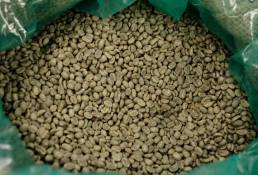
Origin Brings The World Together
There is such a wide swath of people that gather at origin to meet with growers and grade coffee. Emaren relayed a story that she believes captures what this whole industry is about and why she enjoys it so much.
They were in the middle of a mountain in Honduras and during some down time, there ensued a wild UNO game. It was so competitive. The fascinating thing was that there were two guys who were from Russia and Chile, halfway around the world from each other, proceeded to play the game with an additional side set of rules that were exactly the same. It made the game challenging and harder to play. Emeran admits she enjoyed the challenge as everyone was laughing and enjoying the fellowship.
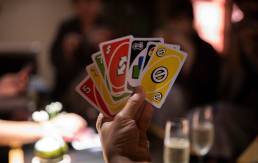
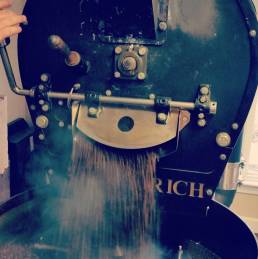
Roasting
A&E Coffee & Tea has established a niche’ in specialty coffee. Their goal is approachability; mostly due to their roasting style. Their mission is to properly develop the coffee beans through the roast curve. This is a very delicate process. The roaster has to understand the coffee bean quality to develop it correctly. Otherwise, the coffee can taste really bad. They understand how to take a coffee from the green to the place on the roasting spectrum that brings out its best qualities. This allows for many different palates and preferences to have a place at the coffee table. Emeran has a way of meeting people where they are at and bringing them alongside her as they experience the world of coffee together. Approachability and their passion to educate others about specialty coffee is what makes their business so unique.
"Most People Like Coffee..." -Emeran Langmaid
Adam and Emaren love what they do. Emaren shared that, “Most people like coffee. The barrier is pretty low. You don’t have to strongarm someone into having a cup. There is a social aspect to it. We are are very emotional around coffee. We use it to wake up in the morning. We use it to get together with friends. There is a lifestyle element that goes on with coffee… It is representing the partners we have at origin. Before COVID being able to travel and see the partners and the pride they have in the work that they do. It’s being able to show the finished product. That is 100% honor. It makes me want to do my job better; to represent their product better.”
Their cafe’ is located in Manchester, NH. Go visit and experience what specialty coffee can be.
Related Posts
September 28, 2022
KONA COFFEE
Just the other day I happened to wake up early. That is unusual for an…

